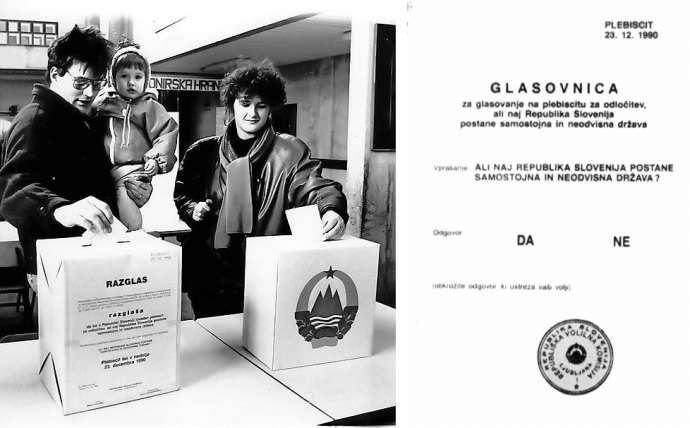STA, 22 December 2020 - On Wednesday, 23 December, Slovenia will mark three decades since a decision that is seen as a landmark in the nation's history: an independence referendum at which the overwhelming majority opted to leave Yugoslavia. The referendum results were declared three days later, on what is now celebrated as Independence and Unity Day.
Following a rising wave of pro-democratic movements in the 1980s, the first free multi-party general elections were held in April 1990. The Democratic Opposition of Slovenia (DEMOS) won, formed a government and completed key steps towards the independence referendum in cooperation with the opposition.
Lojze Peterle, the first prime minister, says the idea for a referendum had been around at the time DEMOS was formed, with the final decision to hold a vote taken at a 9-10 November meeting in Poljče, at which members of a commission that drafted Slovenia's constitution helped convince DEMOS deputies to confirm the proposed vote.
While the opposition wanted to shift the referendum to the spring of 1991, it eventually accepted the December date. In return, DEMOS and the government acquiesced to the rule that the referendum would be successful if at least half of all the eligible voters opted for independence. DEMOS had initially wanted an ordinary majority.
On 6 December 1990, the representatives of political parties and deputy groups in parliament signed a compromise agreement in which all signatories pledged to work together in preparing and executing the referendum. They stated that they were aware of the historical significance of the decision.
Based on that agreement, the parliament passed a law on the independence referendum. The vote was unanimous, with four MPs abstaining.
"The signing of the agreement was very important since it was a strong message to the people that Slovenian politics is united," Peterle has told the STA. Milan Kučan, president at the time, said the agreement had helped overcome distrust.
On 23 December, independence was confirmed with a 95% majority on a turnout of 93.2%, which means that over 88% of all eligible voters voted in favour. When the results were proclaimed shortly after 10pm, DEMOS leader Jože Pučnik famously said that Yugoslavia no longer existed. Both Peterle and Kučan say they never doubted the outcome of the referendum.
The results of the referendum were officially proclaimed on 26 December, which has since been celebrated as Independence and Unity Day. Immediately thereafter, proceedings for a formal declaration of independence were initiated and Slovenia declared independence on 25 June 1991.
Due to the coronavirus epidemic, celebrations of the landmark event will be muted.
President Borut Pahor will host an open day and address the people via video. The ceremony itself will be a pre-recorded TV show with an address by Prime Minister Janez Janša, while the National Assembly will hold a brief ceremonial session.






